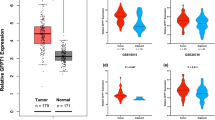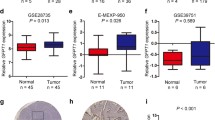Abstract
Purpose
Pyruvate kinase muscle isoenzyme 2 (PKM2) is a key enzyme in aerobic glycolysis and is thought to contribute to cancer cell metabolic reprogramming. The aim of this study was to evaluate PKM2 immunohistochemical expression as a potential prognostic biomarker in pancreatic ductal adenocarcinoma (PDAC).
Methods
A tissue microarray was constructed using surgical specimens for 115 patients who underwent resections for PDAC, stained with PKM2 antibody, and scored for expression level. Statistical analyses were performed to investigate the association between PKM2 and patient survival, tumor stage, tumor grade, surgical margin status, lymph node ratio, perineural invasion status, or the use of adjuvant chemotherapy.
Results
Fifty-three percent of tumors had positive PKM2 expression, and 47 % of tumors had negative PKM2 expression. PKM2 expression was associated with overall survival (HR 0.56, p = 0.007) and CA 19-9 levels (p = 0.035), but was not associated with tumor stage, tumor grade, surgical margin status, lymph node ratio, perineural invasion, or adjuvant chemotherapy use.
Conclusions
PKM2 expression is associated with overall survival in PDAC. Further studies are warranted to validate the value of PKM2 as a prognostic biomarker and to examine the potential utility of PKM2 in predicting treatment response, as well as a potential therapeutic target in PDAC.





Similar content being viewed by others
References
Warburg O, Posener K, Negelein E. Ueber den stoffwechsel der tumoren. Biochem Z. 1924;152:319–44.
Vander Heiden MG, Cantley LC, Thompson CB. Understanding the Warburg effect: the metabolic requirements of cell proliferation. Science. 2009;324:1029–33.
Sutendra G, Michelakis ED. Pyruvate dehydrogenase kinase as a novel therapeutic target in oncology. Front Oncol. 2013;3:38.
Harada K, Saheki S, Wada K, et al. Purification of four pyruvate kinase isoenzymes of rats by affinity elution chromatography. Biochem Biophys Acta. 1978;524:327–39.
Noguchi T, Yamada K, Inoue H, et al. The L- and R-type isoenzymes of rate pyruvate kinase are produced from a single gene by use of different promoters. J Biol Chem. 1987;262:14366–71.
Noguchi T, Inoue H, Tanaka T. The M1- and M2-type isoenzymes of rate pyruvate kinase are produced from the same gene by alternative RNA splicing. J Biol Chem. 1986;261:13807–12.
Christofk HR, Vander Heiden MG, Harris MH, et al. The M2 slice isoform of pyruvate kinase is important for cancer metabolism and tumor growth. Nature. 2008;452:230–3.
Cortes-Cros M, Hemmerlin C, Ferretti S, et al. M2 isoform of pyruvate kinase is dispensable for tumor maintenance and growth. Proc Natl Acad Sci U S A. 2013;110:489–94.
Goldberg MS, Sharp PA. Pyruvate kinase M2-specific siRNA induces apoptosis and tumor regression. J Exp Med. 2012;209:217–24.
Zhou CF, Li XB, Sun H, et al. Pyruvate kinase M2 is upregulated in colorectal cancer and promotes proliferations and migration of colon cancer cells. IUBMB Life. 2012;64:775–82.
Anastasiou D, Yu Y, Israelsen WJ, et al. Pyruvate kinase M2 activators promote tetramer formation and suppress tumorigenesis. Nat Chem Biol. 2012;8:839–47.
Israelsen WJ, Dayton TL, Davidson SM, et al. PKM2 isoform-specific deletion reveals a differential requirement for pyruvate kinase in tumor cells. Cell. 2013;155:397–409.
Siegel R, Naishadham D, Jermal A. Cancer statistics, 2013. CA Cancer J Clin. 2013;63:11–30.
Yeo CJ, Abrams RA, Grochow LB, et al. Pancreaticoduodenectomy for pancreatic adenocarcinoma: postoperative adjuvant chemoradiation improves survival. A prospective, single-institution experience. Ann Surg. 1997;225:621–33.
Sohn TA, Yeo CJ, Cameron JL, et al. Resected adenocarcinoma of the pancreas-616 patients: results, outcomes, and prognostic indicators. J Gastrointest Surg. 2000;4:567–79.
Cameron JL, Pitt HA, Yeo CJ, et al. One hundred and forty-five consecutive pancreaticoduodenectomies without mortality. Ann Surg. 1993;217:430–8.
Balcom JH, Rattner DW, Warshaw AL, et al. Ten-year experience with 733 pancreatic resections: changing indications, older patients, and decreasing length of hospitalization. Arch Surg. 2001;136:391–8.
Birkmeyer JD, Finlayson SR, Tosteson AN, et al. Effect of hospital volume on in-hospital mortality with pancreaticoduodenectomy. Surgery. 1999;125:250–6.
Edge SB, Byrd DR, Compton CC, et al., editors. AJCC cancer staging manual. 7th ed. New York: Springer; 2010.
Washington K, Tang LH, Berlin J, et al. Protocol for the examination of specimens from patients with carcinoma of the endocrine pancreas. College of American Pathologists Cancer Protocols: Pancreas (exocrine). 2009.
Han CP, Lee MY, Tzeng SL, et al. Nuclear receptor interaction protein (NRIP) expression assay using human tissue microarray and immunohistochemistry technology confirming nuclear localization. J Exp Clin Cancer Res. 2008;27:25.
Koo CL, Kok LF, Lee MY, et al. Scoring mechanisms of p16INK4a immunohistochemistry based on either independent nucleic stain or mixed cytoplasmic with nucleic expression can significantly signal to distinguish between endocervical and endometrial adenocarcinomas in a tissue microarray study. J Transl Med. 2009;7:25.
Greenland S, Perl J, Robins JM. Causal diagrams for epidemiologic research. Epidemiology. 1999;10:37–48.
White IR, Royston P, Wood AM. Multiple imputation using chained equations: issues and guidance for practice. Stat Med. 2011;30:377–99.
R Core Team. R: a language and environment for statistical computing. Vienna: R Foundation for Statistical Computing. 2013. ISBN 3-900051-07-0, URL http://www.R-project.org/.
Iqbal MA, Gupta V, Gopin P, et al. Pyruvate kinase M2 and cancer: an updated assessment. FEBS Lett. 2014. http://dx.doi.org/10.1016/j.febslet.2014.04.011
Lim JY, Yoon SO, Seol SY, et al. Overexpression of the M2 isoform of pyruvate kinase is an adverse prognostic factor for signet ring cell gastric cancer. World J Gastroenterol. 2012;18:4037–43.
Mukherjee J, Phillips JJ, Wiencke J, et al. Pyruvate kinase M2 expression, but not pyruvate kinase activity, is up-regulated in a grade-specific manner in human glioma. PLoS One. 2013;8:e57610.
Zhang X, He C, He C, et al. Nuclear PKM2 expression predicts poor prognosis in patients with esophageal squamous cell carcinoma. Pathol Res Pract. 2013;209:510–5.
Li J, Yang Z, Zou Q, et al. PKM2 and ACVR 1C are prognostic markers for poor prognosis of gallbladder cancer. Clin Transl Oncol. 2014;16:200–7.
Rimm DL, Camp RL, Charette LA. Tissue microarray: a new technology for amplification of tissue resources. Cancer J. 2001;7:24–31.
Hathurusinghe HR, Goonetilleke KS, Siriwardena AK. Current status of tumor M2 pyruvate kinase (tumor M2-PK) as a biomarker of gastrointestinal malignancy. Ann Surg Oncol. 2007;14:2714–20.
Kumar Y, Gurusamy K, Pamecha V, et al. Tumor M2-pyruvate kinase as a tumor marker in exocrine pancreatic cancer: a meta-analysis. Pancreas. 2007;35:114–9.
Tamada M, Suematsu M, Saya H. Pyruvate kinase M2: multiple faces for conferring benefits on cancer cells. Clin Cancer Res. 2012;18:5554–61.
Kumar Y, Mazurek S, Yang S, et al. In vivo factors influencing tumor M2-pyruvate kinase level in human pancreatic cancer cell lines. Tumour Biol. 2010;31:69–77.
Funding
The project described was supported by Cancer Center Support Grant (CCSG) National Institutes of Health (NIH) P30 CA68485 and Grant UL1 RR024975-01 and is now at the National Center for Advancing Translational Sciences, Grant 2 UL1 TR000445-06. The content is solely the responsibility of the authors and does not necessarily represent the official views of the NIH.
Conflict of Interest
The authors declare they have no competing interests.
Author information
Authors and Affiliations
Corresponding author
Rights and permissions
About this article
Cite this article
Lockney, N.A., Zhang, M., Lu, Y. et al. Pyruvate Kinase Muscle Isoenzyme 2 (PKM2) Expression Is Associated with Overall Survival in Pancreatic Ductal Adenocarcinoma. J Gastrointest Canc 46, 390–398 (2015). https://doi.org/10.1007/s12029-015-9764-6
Published:
Issue Date:
DOI: https://doi.org/10.1007/s12029-015-9764-6




